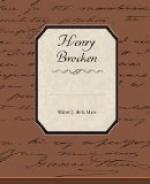“Yet both seem happy now to share it,” I said, “or how else were they comforted?” Nor did I consider before she told me that they will run again when they be grown men, Sleep and Death, in just such a thick darkness before dawn; and one called Love will then run with them, who is very vehement and fleet of foot, and never turns aside, nor falters. He who then shall win may ask a different prize. For truth to tell, she said, only children can find delight for long in dust and ruin.
At that moment Death himself came hastening to his mother, and, taking her hand, turned to the enormous picture of the skies as if in some faint apprehension. But Sleep saw nothing amiss, lay at full length among the “cool-rooted flowers,” while Rosinante grazed beside him.
I told her also, in turn, of my journey; and that although transient, or everlasting, solace of all restlessness and sorrow and too-wild happiness may be found in them, yet men think not often on these divine children.
“As for this one,” I said, looking down into the pathless beauty of Death’s grey eyes, “some fear, some mock, some despise him; some violently, some without complaint pursue; most men would altogether dismiss, and forget him. He is but a child, no older than the sea, no stranger than the mountains, pure and cold as the water-springs. Yet to the bolster of fever his vision flits; and pain drags a heavy net to snare him; and silence is his echoing gallery; and the gold of Sleep his final veil. They shall play on; and see, lady, flame has left the clouds; the birds are at rest. The earth breathes in, and it is day; and exhales her breath, and it is night. Let them then play secret and innocent between her breasts, comfort her with silence above the tempest of her heart.... But I!—what am I?—a traveller, footsore and far.”
And then it was that I became conscious of a warm, sly, youthful hand in mine, and turned, half in dread, to see only happy Sleep laughing under his glistening hair into my eyes. I strove in vain against his sorcery; rolled foolish orbs on that pure, starry face; and then I smelled as it were rain, and heard as it were tempestuous forest-trees—fell asleep among the tombs.
XIII
I warmed both hands before the fire of life.
—WALTER SAVAGE LANDOR.
Surely some hueless poppy blossomed in the darkness of those ruins, or the soulless ashes of the dead breathe out a drowsy influence. Never have I slept so heavily, yet never perhaps beneath so cold a tester. Sunbeams streaming between the crests of the cypresses awoke me. I leapt up as if a hundred sentinels had shouted—where none kept visible watch.
An odour of a languid sweetness pervaded the air. There was no wind to stir the dew-besprinkled trees. The old, scarred gravestones stood in a thick sunshine, afloat with bees. But Rosinante had preferred to survey sunshine out of shade. In lush grass I found her, the picture of age, foot crook’d, and head dejected.




